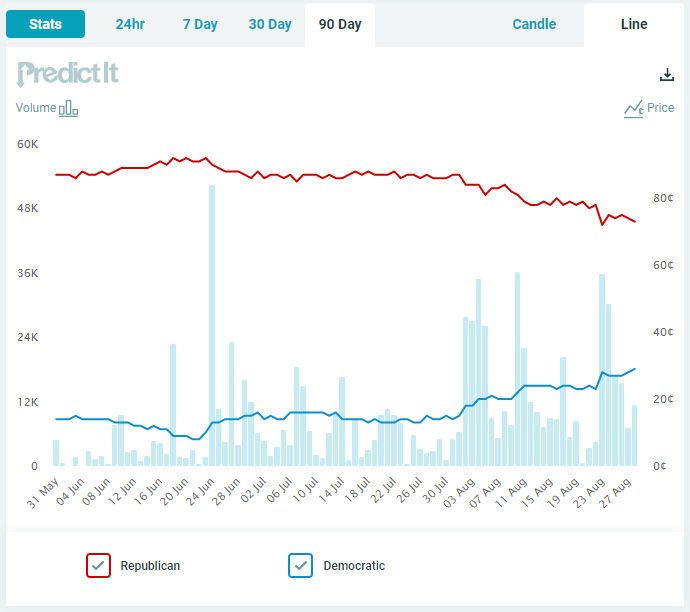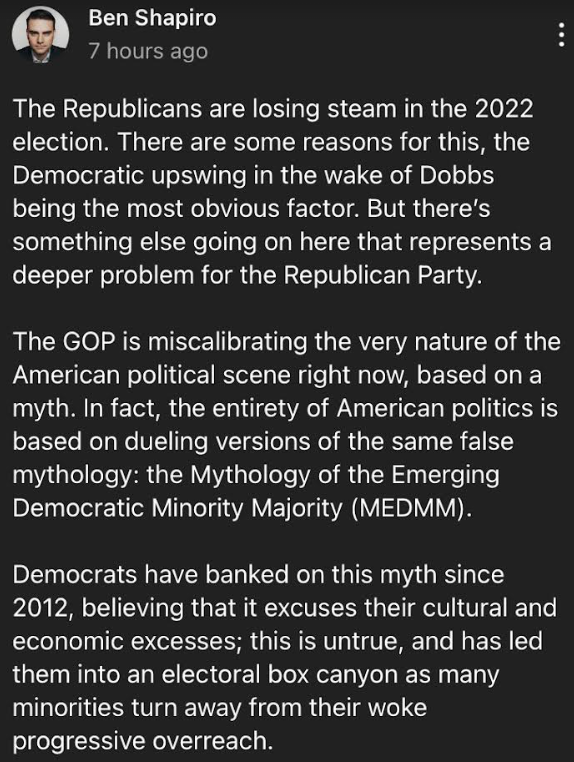By Kent R. Kroeger (Source: NuQum.com, August 29, 2022)
[Note: The dataset used in this data essay is available on GITHUB.]
If we aren’t allowed to make mistakes, we will never make progress.
A number readers complained about my U.S. House 2022 midterm prediction — beyond that fact it predicts a GOP landslide win — saying that one of the independent variables in my linear model (average presidential approval from August to October in the election year) required information close to Election Day. As they rightfully point out, in previous essays I have argued that there is little value in a prediction model that requires information right up to the point of the event itself.
The farther out in time your model can predict an event, the more useful your model.
Accordingly, I replaced the presidential approval variable that needed data from late October with one that used the president’s approval at the end of August (Gallup Poll).
Unsurprisingly, the prediction model for the U.S. House 2022 midterms did not change significantly from the previous model (see Figure 1); but, equally without surprise, it does not fit the data as well (adjusted R-squared 0.78 vs. 0.69).
Figure 1: Linear model of House seat gains/losses by President’s Party in Midterm Elections (1950 to 2018)

Using August presidential approval data, my model predicts the Republicans will gain 53 seats in November (compared to my previous model’s prediction of a 55-seat gain).
Obviously, this prediction puts me far outside current predictions from mainstream polling and political pundits, some suggesting the Democrats will maintain control of the U.S. House after the 2022 midterms.
They may be right.
But I would remind everyone that Barack Obama had 46 percent presidential approval in August 2010 (and a fast-improving economy coming out of the 2008 world financial crisis) — three months prior to his party losing 63 House seats in the 2010 midterm elections.
I am not surprised that my prediction model — heavily weighted towards economic conditions and presidential approval — should predict a House loss of 53 seats for the Democrats in 2022.
But that doesn’t mean my model is accurate. How has it done in the past?
In 2018, my model predicted the GOP would lose 44 House seats — they lost 40.
In 2014, the model predicted the Democrats would lose 30 seats — they lost 13.
In 2010, it predicted the Democrats would lose 51 seats — they lost 63.
[I would note that the combined predictions for 2010 and 2014 weren’t too far off — I predicted the Democrats would lose 81 seats over those two midterm elections…in reality, they lost 76 seats.]
My model is far from perfect and every recent indicator is telling me it may not work well in 2022.
And why might it fail?
Figure 2, which shows the prediction over time of the largest political futures market in the world (PredictIt), offers a clue.
No, it’s not the U.S. Supreme Courts’ Dobbs decision overturning Roe v. Wade. That decision on June 24th, at best, increased the Democrats’ chance of keeping control of the U.S. House by eight percent. And Speaker of the House Nancy Pelosi’s trip to Taiwan in early August apparently increased the Democrats’ chances by another five percent.
Figure 2: PredictIt Forecast for Control of U.S. House over past 90 days

But another event has fundamentally changed the dynamics going into the 2022 midterms: the FBI’s raid on Donald Trump’s Mar-a-Lago home on August 8th.
Since that event, the Democrats’ chances of keeping control of the U.S. House, according to investors on PredictIt.com, has increased from 19 percent to 29 percent.
The Dobbs decision was big, but the Mar-a-Lago raid is bigger and the trend since the FBI raid in the Democrats’ chances of keeping control of the House remains favorable to the Democrats.
How could the Republicans have stumbled so badly in what should be a decisive electoral triumph?
My prediction model says they won’t stumble, but I defer to the podcast-terrifying-monster-to-liberals Ben Shapiro to explain why the GOP might:



Shapiro is right, though I’m not sure why he thinks the Republicans losing momentum is “a mystery wrapped in an enigma.”
It is rather clear in the data why the Republicans are losing momentum.
They’ve hitched their wagon to a man (Trump) who seems disconnected from his own party’s electoral success.
That is not a ticket to success.
I, personally, find the FBI-Mar-a-Lago raid more puzzling than indicative of a major threat to U.S. national security. Am I to believe the U.S. Department of Justice is going to indict of former U.S. president on a vaguely-written, antiquated law (The Espionage Act of 1917) designed expressly to silence dissent against U.S. involvement in World War I and rarely enforced successfully, except in one example where it was used to convict Socialist presidential candidate Eugene V. Debs, the Bernie Sanders of his day, on sedition charges?
Despite being called a “traitor to his country” by President Woodrow Wilson for his opposition to the World War I draft, Debs is today viewed by historians as an articulate, passionate defender of workers’ rights and underclass Americans — hardly a traitor.
Nonetheless, Debs effectively spent his last years of life in an Atlanta federal prison because he had political enemies at the highest echelons of government. Julian Assange knows the routine.
As for Trump, even the establishment leftists at The Atlantic recognize the president’s plenary powers over the classification process, though they assert this power does not extend to nuclear secrets:
“The 1988 Supreme Court case Navy v. Egan confirmed that classification authority flows from the president except in specific instances separated from his powers by law. And here is where things get theological: A president can make most documents classified or declassified simply by willing them so.”
But how can a president be separated from his constitutional powers via a congressional law? A president can’t hand away his or her constitutionally-defined rights any more than an individual citizen can wave off their similarly established rights.
Buzzard’s guts man, as Commander-in-Chief, the president is clothed in enormous power…cue one of my favorite movie scenes of all-time:
My point is not that Trump is legally immune to prosecution for exfiltrating critical national security documents from the White House. It is, however, my contention that partisan proclamations that Trump’s exposure to indictment (and conviction) is self-evident are not only premature, they are not clearly established in existing law and judicial interpretations of that law.
Given the U.S. government refused to prosecute two American Israel Public Affairs Committee (AIPAC) lobbyists on violations of the Espionage Act for passing top secret defense information to the Israeli government and the news media, it seems unlikely they will pursue a similar prosecution against a former president — even if that former president is Donald Trump.
Ultimately, the courts — probably the Supreme Court — will decide if Trump violated any criminal laws.
In the meantime, the American voter, with little interest in the nuances of Constitutional law but peppered day and night on how dangerous Trump is to national security, will decide in November if they’d rather have the Republicans instead of the Democrats in control of the Congress.
The Republicans would be smart to focus on an economy on the brink and a world security situation which, by the day, brings us closer to a hot war — perhaps even a limited nuclear war — with Russia and China.
Are the Republicans dependable enough to handle these critical problems?
If the Republicans want to regain control of Congress, that needs to be the question facing voters in November, not whether Trump violated secrecy laws.
- K.R.K.
Send comments to: kroeger98@yahoo.com
